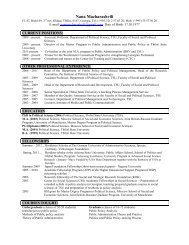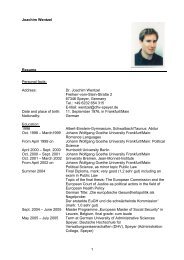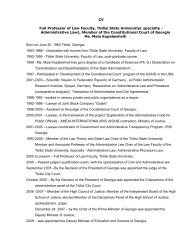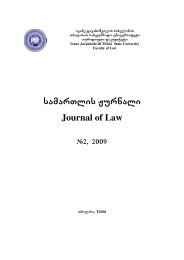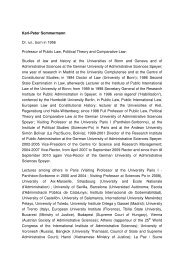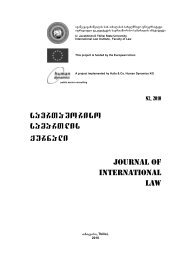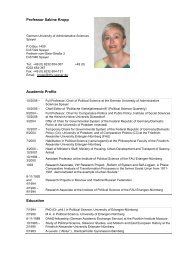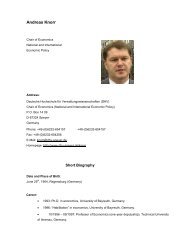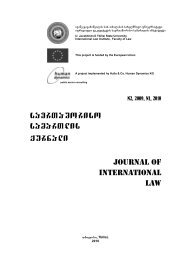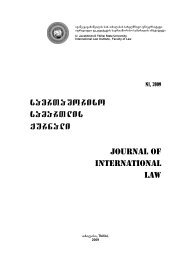Untitled
Untitled
Untitled
Create successful ePaper yourself
Turn your PDF publications into a flip-book with our unique Google optimized e-Paper software.
M. GOTSIRIDZE, DIPLOMATIC PROTECTION OF NATURAL AND LEGAL PERSONS IN INTERNATIONAL ...<br />
force a State to exercise his/her protection in<br />
international law regime. Furthermore, "should<br />
the natural or legal persons on whose behalf<br />
[the State exercise diplomatic protection] consider<br />
that their rights are not adequately protected,<br />
they have no remedy in international<br />
law" 13 However, in this respect the positive trends<br />
in contemporary practice of the States shall<br />
be underscored. Some members of the international<br />
legal community believe that individual<br />
should be entitled to request a State to<br />
exercise diplomatic protection as a matter of<br />
right on their behalf. Although limited, there is<br />
in fact some State practice to support this<br />
view. 14 Constitutional provisions in a number<br />
of States recognize the right of individual to<br />
receive diplomatic protection for injuries suffered<br />
abroad. 15 Among these States is Georgia<br />
as well. In accordance with Article 13 of the<br />
Constitution of Georgia: "Georgia shall protect<br />
its citizens irrespective of their location."<br />
In spite of the abovementioned positive<br />
trends, the fact remains that traditional principle<br />
on the right of a State to the exercise diplomatic<br />
protection still maintains binding force<br />
in international law. International Law Commission<br />
refused the proposal on the recognition<br />
of limited obligation of a State on exercising<br />
diplomatic protection. 16 However, it could not<br />
neglect absolutely these positive trends. Commission<br />
in the draft Articles on diplomatic protection<br />
included Article 19(a) 17 , which somehow<br />
recommends a State to not leave without<br />
the State protection especially that citizens,<br />
who suffered by the significant damage.<br />
3.2. Beneficiaries of the Mechanism<br />
of Diplomatic Protection<br />
Nationality is a bound between the State<br />
and injured person, which provides the basis<br />
for exercising diplomatic protection. 18 In this<br />
case the term national includes as natural as<br />
well as legal persons. In defining the nationality<br />
of natural and legal persons, we face certain<br />
characters for each of them, for that reason<br />
this two groups are discussed separately.<br />
Natural Persons. Historically it was a prerogative<br />
of a State to define who its nationals<br />
were. Permanent Court of International Justice<br />
on the case "Nationality Decrees in Tunis<br />
and Morocco" defined that questions of nationality<br />
wera in principle within domestic competence<br />
[of the States]. 19 Provision of the same<br />
content was included in the Convention "on<br />
Certain Questions Relating to the Conflict of<br />
National Laws" of 1930. 20<br />
Although the exclusive right of each State<br />
to determine who are its nationals was recognized<br />
in the context of international law, the<br />
case is not so simple, as it is seen. In the<br />
frames of international law mentioned right of<br />
a state to determine the nationality of a person<br />
is limited. 21 In particular, following to the<br />
international law all those persons who under<br />
the jurisdiction of a State are recognized as<br />
its nationals, in this case for the purpose of<br />
diplomatic protection, may not be considered<br />
as nationals of this country at all.<br />
As Article 4 of draft Articles formulated by<br />
the International Law Commission, recognizes<br />
the right of a State to determine who can<br />
be its national, at the same time establishes<br />
the limitation of this right in frames of international<br />
law. 22 The Article provides for non-comprehensive<br />
list of methods of nationality which<br />
complies with international law. Nationality acquired<br />
by birth, descent, naturalization, succession<br />
of State totally corresponds to the grounds<br />
of acquisition of nationality in the scope of international<br />
law. However there are also such<br />
forms of acquisition of nationality, which are<br />
totally acceptable under domestic law, but are<br />
unacceptable under international law; For example,<br />
automatically acquisition of the nationality<br />
by a spouse as a result of marriage. 23<br />
Thus, a person being a national of a State<br />
with full rights in accordance with the domestic<br />
legislation, has a political and legal bound<br />
with it, performs its national obligations in a<br />
good faith, pays taxes, etc, will not be able to<br />
enjoy State protection, unless its nationality<br />
falls under the definition of "national" following<br />
to international law.<br />
Legal Persons. According to the customary<br />
international law on diplomatic protection<br />
and international practice on this issue, also<br />
Articles of draft Articles elaborated by the International<br />
Law Commission of the UN, diplomatic<br />
protection covers not only natural but<br />
legal persons as well. Diplomatic protection<br />
of Legal persons is very important and diverse<br />
area. Here we have to distinguish protection<br />
of corporations and non-profit-making legal<br />
persons. Furthermore, not only corporations<br />
enjoy diplomatic protection but also their<br />
shareholders.<br />
239



